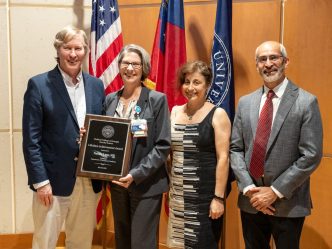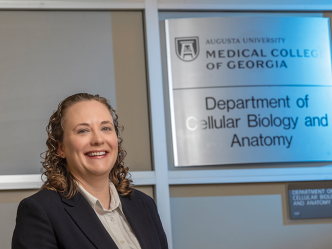More than 15,000 Georgians die each year from drug overdose, many involving opioids. Augusta University Health is now offering a Comprehensive Addiction Management Program (CAMP) to help patients break the addiction cycle, and part of this program includes medication-assisted treatment.
Dr. Joseph Hernandez, associate professor in the Medical College of Georgia‘s Department of Psychiatry and Health Behavior, has recently begun prescribing bupenorphine and naltrexone (Vivitrol). These medications are FDA-approved for treating addictions to prescription and non-prescription opiates including morphine, codeine, heroin, fentanyl, hydrocodone and oxycodone and are administered along with counseling and behavior therapies.
“Medication-assisted therapy is a big thing. Oftentimes patients don’t really have access to it,” Hernandez said. “One in 10 people who have addiction problems end up getting any kind of specialized treatment. There are not a lot of people actually getting treatment out there.”
Through CAMP, AU Health is able to offer both addiction and psychiatric assessments. In addition to being able to prescribe the medications, physicians ensure patients have psychosocial support and medical access, and that they are going to group meetings or getting a sponsor — whatever pathway patients choose in order to get clean. Inpatient treatment is also an option, if necessary.
“This is the first time we’ve ever done any kind of addiction treatment on an outpatient basis here,” Hernandez said.
Receiving approval to use medications has taken months to put into place, Hernandez said. These medications mimic the effects of opioids just enough to reduce the effects of withdrawal.
Buprenorphine is a partial agonist, which means it partially activates the opioid receptor. This makes it safer than full opioids because the patient is less likely to overdose. In a majority of patients and when used appropriately, there is no “high” sensation. It provides enough opioid stimulation to treat cravings and withdrawal while allowing patients to function normally. Patients must be experiencing withdrawal symptoms before the medication can be administered.
Vivitrol is a long-acting naltrexone injection that is an opioid antagonist. This blocks the opioid receptor, treating cravings as well as blocking the effect of any opioids used. A patient must wait seven days after their last opioid use or risk going into severe withdrawal.
The medications are administered as one leg of support, along with a strong support system and behavioral and cognitive therapy.
“We’re not just providing medications without giving therapy,” Hernandez said.
Hernandez said he is also working on a business plan with Drs. Richard Camino and Marshall Bedder to open an Intensive Outpatient Program soon. The program will be held three days a week, from 6-9 p.m. Monday, Wednesday and Friday. This program enables the patient to remain at home through treatment. Patients will deepen their understanding of addiction and learn positive reactions and behaviors to stresses that will help them maintain sobriety.
For more information or to schedule an appointment, visit the website or call 706-721-6597.
 Augusta University
Augusta University




